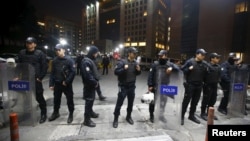Turkey was rocked this week by a series of incidents in the air and on the ground.
Two Turkish Airlines planes this were forced to re-route their flight paths after bomb scares. There were also three armed attacks in Istanbul targeting the police headquarters, a courthouse and the ruling party's offices that resulted in four deaths. One of the attacks involved two leftist militants who took an Istanbul prosecutor hostage in his office.
The country's ruling AK Party has promised a security crackdown, while the opposition claims the ruling party is exploiting the attacks, which come just months before critical elections in which AK is facing its first serious challenge in more than a decade.
The surge in political violence is likely to stir memories of earlier periods of instability in Turkey, says Yuksel Taskin, a political scientist at Istanbul’s Marmara University.
"It reminds us of the late '80s and early '90s, [when] very ordinary, let’s say, innocent police [were] targeted," Taskin said. "People in Turkey don't want to return to 1990s and 1980s. People want to solve their problems in parliament."
Much of Turkey’s modern political history has been bloody. The 1970s were characterized by violent clashes bordering on civil war between radical right and left parties, prompting the 1980 military coup. Much of the 1980s saw illegal left-wing groups targeting Turkey’s then military rulers, in a series of assassinations.
With fears of resurgent political violence, international relations expert Soli Ozel of Istanbul’s Kadir Has University says the government is likely to hit back hard.
“With [the] now justifiable, or seemingly justifiable, pretext of fighting terrorism, I am afraid there will be more infringements on personal liberties, the rights of association, freedom of expression and all those things," he said.
AK party leaders are already facing domestic and foreign criticism over a recently introduced law that markedly extends powers of state security forces.
The opposition has accused the government of turning the country into a police state, But Prime Minister Ahmet Davutoglu has promised further measures in the aftermath of this week’s violence.
Taskin says political violence could now be a key factor in June’s general election.
“If, for example, there is further escalation [in violence], what will happen is the AK [party] will claim the latest security measures were justified," he said, adding that further violence would only prove their political case for the increased restrictions. "Escalation of violence [will] always favor groups or parties who want to restrict freedoms.”
Turkey's sluggish economy, along with divisions within the ruling party and signs the opposition is gaining in opinion polls, mean June's election is likely to present AK leaders with their first significant electoral challenge since coming to power in 2002.
Opposition leaders have accused the ruling party of exploiting the latest political violence or even having a hand in it. Some observers have expressed concern about what may happen in the two months leading to election day.
Portions of this report are from Reuters.












